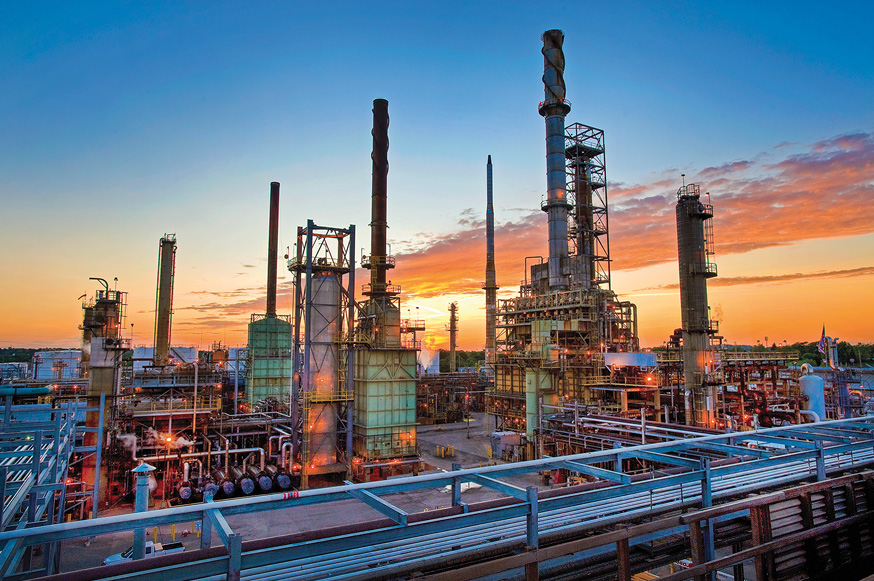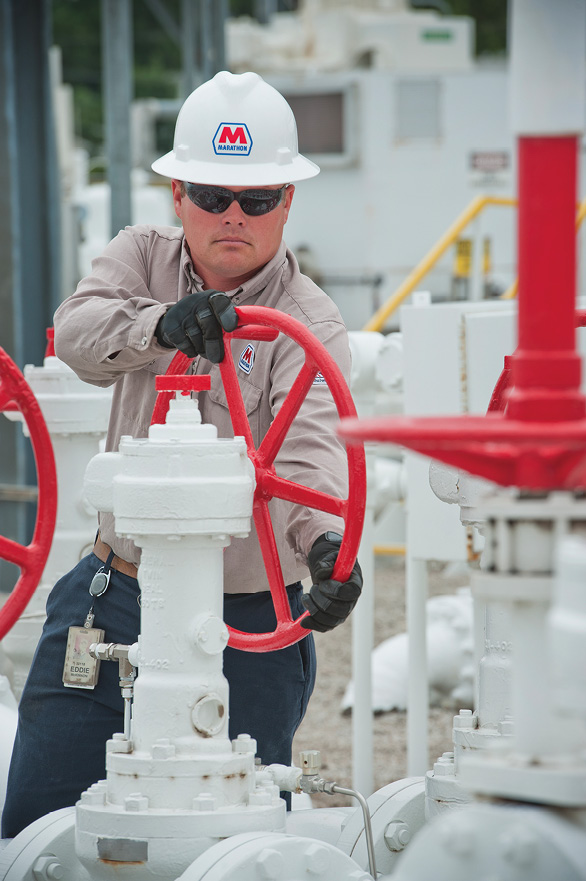- Home
- Media Kit
- Current Issue
- Past Issues
- Ad Specs-Submission
- Ad Print Settings
- Reprints (PDF)
- Photo Specifications (PDF)
- Contact Us

![]()
ONLINE

Leadership Principles
Editors’ Note
Gary Heminger is also Chairman of the Board and Chief Executive Officer of MPLX GP LLC. He joined Marathon in 1975. In addition to five years in various financial and administrative roles, he spent three years in London as audit supervisor of the Brae Project. He worked with Emro Marketing, the predecessor of Speedway SuperAmerica LLC, for eight years in several marketing and commercial roles. In 1991, he was named Vice President of Emro Marketing’s Western Division. Following that, he served as President of Marathon Pipe Line Company; Manager, Business Development & Joint Interest of Marathon Oil Company; and Vice President of Business Development for Marathon Ashland Petroleum (MAP). Heminger was named president of MAP and later appointed president of Marathon Petroleum Company LLC. He was named president and CEO of Marathon Petroleum Corp. in July of 2011. Heminger earned a bachelor’s degree in accounting from Tiffin University in 1976 while already employed by Marathon Oil Company in Findlay, Ohio. He is past Chairman of the Board of Trustees of Tiffin University. He earned a master’s degree in business administration from the University of Dayton, Ohio and is a graduate of the Wharton School Advanced Management Program at the University of Pennsylvania.
Company Brief
Marathon Petroleum Corporation (marathonpetroleum.com; MPC) is the nation’s third-largest refiner, with a crude oil refining capacity of approximately 1.8 million barrels per calendar day in its seven-refinery system. Marathon-brand gasoline is sold through approximately 5,500 independently owned retail outlets across 19 states. In addition, Speedway LLC, an MPC subsidiary, owns and operates the nation’s second-largest convenience store chain, with approximately 2,730 convenience stores in 21 states. MPC also owns, leases, or has ownership interests in approximately 10,800 miles of pipeline. Through subsidiaries, MPC owns the general partner of MPLX LP, a midstream master limited partnership. MPC’s fully integrated system provides operational flexibility to move crude oil, feedstocks, and petroleum-related products efficiently through the company’s distribution network in the Midwest, Southeast, and Gulf Coast regions.
What has been the key to the success of Marathon, and what is its competitive advantage?
First and foremost, our success is due to our committed employees and the culture we all help to create and sustain. We assess our employee engagement every two years, and we have consistently had top-tier results since we became an independent company six years ago. Part of that is because we have passionate leaders who lead by example – they are visibly committed to our values of health and safety, environmental stewardship, integrity, diversity and inclusion, and citizenship, and they reinforce this at all levels.
In order to nurture this competitive advantage, we have an approach to performance that focuses on what is done and how it is done, and we apply it both to our employees and our leadership. Our management is also guided by a leadership profile and defined competencies so that it’s clear what we want our leadership to be, know, and do.
Because we believe strongly that our people are our biggest advantage, our leaders’ most critical function is to support, guide, and prepare our employees every day. We put an enormous amount of thought into making sure our people have all the development, tools, and resources they need to be successful.
Do you see growth in your refining, midstream, and retail segments, and what specific opportunities do you see in natural gas?
In refining we’re going to invest to continue to improve our value capture – that is, how we make a higher value product out of the crude oil we refine. Each investment we’re making in refining is not necessarily to grow volume but to improve the product yield.
In natural gas, we see tremendous growth. We have a very big midstream presence in the Marcellus and Utica shale regions, in Southwest Oklahoma, and in the Permian. We see tremendous growth with technological advancements in the shale basins of the country. Therefore, we will continue to invest in gathering and processing assets and in the transportation assets to get those liquids to market.
When it comes to our crude oil and refined product pipelines, I see more of a steady state in those businesses, which takes us back to refining. The U.S. has adequate refining capacity, and refined product is getting to the market through our existing logistics networks.
Going forward, we might see some shifting of markets, but I don’t see much growth on the refined products side. All of the growth is on the natural gas side.
Finally, we see significant growth opportunities for our Speedway business. We see tremendous opportunities to grow our gasoline and convenience store markets.

Marathon Petroleum Corp.’s refinery in Canton, Ohio,
is part of the corporation’s seven-refinery system,
which can process approximately 1.8 million barrels
per day
of crude oil
How critical have investments in technology been for the business, and how much of an impact has new technology had when it comes to the industry?
There have been tremendous improvements in technology.
We now operate all of our refineries from operating control centers that complement the efforts of workers in the operating units. This allows us to have pinpoint control over our assets, and technology can also give us very early warning signs of potential operating issues.
Where the technology has also continued to evolve is in our pipeline segment. Over the past 20 years, we have seen significant increases in both the use and capabilities of in-line inspection smart tools.
These tools carry technology to help identify potential anomalies within the pipe. In addition to highly sensitive geometric measurement and global positioning tools that pinpoint exact locations, we also use magnetic and ultrasonic technologies. It’s similar to using an MRI or an ultrasound during a medical exam. We use this advanced technology to examine our pipelines and give them a clean bill of health until the next checkup.
These tools are specifically designed to travel through crude oil, light products, natural gas liquids, or natural gas being shipped, without disrupting operations. Because the inspection occurs from inside the pipe, we are able to examine the entire pipeline to find anomalies such as metal loss from corrosion, cracks, and even dents, which can come from a third party hitting our pipe.
The best part about using in-line inspection technology is that it has helped the industry greatly reduce the number of incidents and releases. We’ve challenged our leaders to continue partnering with technology providers and industry peers to identify ways to further leverage it for use in our thousands of miles of pipelines.
Another technology frontier is in our retail segment with Speedway, where we have one of the most sophisticated loyalty programs in retail. In addition, we bought 1,250 units on the Eastern Seaboard three years ago and, at all of our units, we have very sophisticated back-room inventory control and labor control systems. From our loyalty program, we know what our customers’ preferences are at different times of day inside the stores. This technology allows us to plan labor for the right time of the day and know what product we need to have prepared. This has translated into tremendous efficiency in our Speedway operations.

Marathon Petroleum Corp. owns, leases, or has
an ownership interest in 10,800 miles of crude oil
and light product pipelines and more than 5,600 miles
of gas gathering and natural gas liquids pipelines
What makes having a diverse workforce so critical, and have you been happy with your efforts in this regard?
We have found that when we use inclusion principles, we see the best level of engagement from our employees. By learning and caring about their people, our leaders are able to unlock ideas and motivation that are unique to each employee.
We’re working toward the mindset with the entire workforce that this is just how we do business – that we always select the best person no matter their age, gender, religion, or sexual orientation, and we provide an inclusive workplace for everyone. Ideally, it’s how humankind should be – evaluating every person based on his or her merits, and seeing the value each one brings – but that is still down the road. We continue to make strides, but we always have to improve.
It’s a shame how divided the world is on many fronts today but, every day, we’re working to get better.
How hard is it today to invest in the future with such short-term pressures?
We run everything here for the long term, but we have to be strong and efficient communicators. We still have to be able to explain quarter-to-quarter realities, and we have to be able to show strength and leadership in our explanation.
We can’t sit back and have a quarterly result dictate what our long-term strategy is going to be.
In a capital-intensive business, we have to have a vision for the long term, and we start this conversation around leadership. We can’t invest in leadership for the short term; we have to invest and develop people for leadership over the long term. That is how we do it. One of my key jobs is to provide leadership, succession planning, and development for the long term.
For example, we collaborate with several universities we recruit from every year. We have agreements with the University of Cincinnati, Michigan State, Louisiana State University, and Ohio State and are exploring agreements with many others.
Our objective is to partner with universities so that we can offer professional opportunities to their best students who are diverse, talented, and motivated. We want to find the best over the years through intern programs and co-op programs.
We kicked this off about three years ago, and it’s starting to pay dividends. We’re investing in students by bringing them into our operations for internships and co-ops, and we’re seeing them return and are offering them jobs. It has been a very successful program for us.
Will you discuss some of the advantages you see Ohio offering as a business-friendly state?
Ohio has been home to our company headquarters for 130 years, so we have had a long-term, productive relationship with the state. We see our presence here as part of our heritage, and we share many of the same priorities as the people of this state, such as economic opportunity for the companies and people who call this state home. That means prioritizing a business-friendly environment, a high-quality workforce, and a regulatory approach that allows people and businesses to compete and serve customers well.
When we became an independent company in 2011, Governor Kasich and his administration helped make it possible for us to remain here. As a result, we have created hundreds of new jobs and continued to invest and grow our legacy of success.•